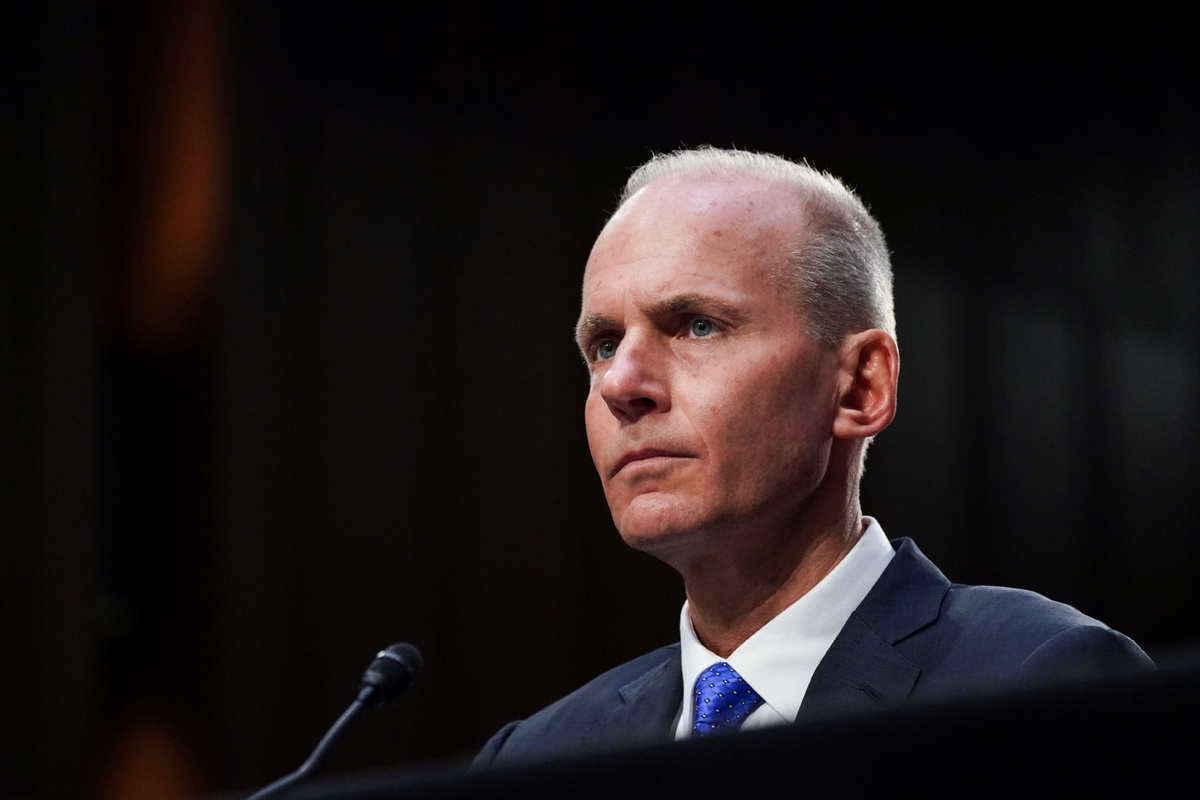Boeing faces questions after firing CEO


Boeing's decision Monday to fire Chief Executive Officer Dennis Muilenburg is a needed first step in restoring the company's credibility and the market reacted favorably to the action, but it raises questions about top management's long-term strength in a competitive field, analysts said.
Muilenburg's tenure was a public relations disaster for Boeing after two crashes of the 737 MAX killed a total of 346 passengers and crew. He was overly optimistic about the 737 MAX's recertification, led airlines to believe the plane would return to service this year and initially mishandled hostility directed at him by family members who lost loved ones in the crashes, critics charged.
Chairman David Calhoun will become Boeing's new CEO on January 13. He's former senior managing director and head of private equity at the Blackstone Group and former chairman of Nielsen Holdings, a marketing and media information company. Muilenburg is an aerospace engineer.
Investors cheered Muilenburg's firing. Boeing's stock rose as high as $340.58 a share in intraday trading and closed Monday at $337.55, up 2.91 percent, or $9.55. The 52-week range is $292.47 to $446.01.
"If the market, Congress and the Federal Aviation Administration (FAA) view Muilenburg as the face of the problem, then today's action at least changes the face," Robert Mann, president of R.W. Mann & Co, an aviation consulting firm in Port Washington, New York, told China Daily.
"Short-term, this is an olive branch. But it appears to be the end of engineers on the Boeing board of directors for now. Given the nature of the company in its commercial aviation, defense and space roles, I don't know that a well-intentioned board of made up of accounts and lawyers has the skills to be informed decision makers."
James Hall, managing partner of Hall & Associates in Washington and former chairman of the National Transportation Safety Board, said Monday's action was long overdue.
"Boeing needs to reset the table and put safety first," he told China Daily. "The whole thing was blown when Boeing lobbied Congress to self-certify the MAX. There were a lot of missteps before Monday's announcement."
Development of the MAX was announced in 2011, the first test flight was completed in January 2016 and the plane entered commercial service in March 2017. Muilenburg joined Boeing in 1985 as an intern before graduating as an aerospace engineer from Iowa State University a year later. He became CEO in 2015. He quickly signed long-term labor deals, worked on a pension deficit and boosted slowing sales in the company's defense division.
"I don't think Muilenburg has done a bad job," John Cochran, president and CEO of Eaglemark, an aviation consulting firm and professor emeritus of aerospace engineering at Auburn University, told China Daily. "He inherited a lot of problems. But Boeing has to go back to square one to figure out the cause of the problem.
"The immediate fix is a software update for MCAS, but based on what I know now, the problem began when Boeing decided to use different engines on the MAX. Boeing has strong strategic plans and lessons learned here will be put to use in the future. Boeing will go through a difficult phase — perhaps for years — but the company will definitely survive."
Competitive factors may have played into the crashes. American Airlines, one of Boeing's best customers for more than 10 years, said it was close to buying several hundred planes from rival Airbus.
Boeing knew it had to act aggressively and quickly to preserve market share, so it abandoned plans for an entirely new plane because design, testing and certification by the FAA and other regulators could take as long as 10 years. To remain competitive, Boeing updated an existing plane, the NG.
The new, fuel-efficient engines on the MAX are larger and positioned farther forward on the wing and closer to the fuselage than those on the NG. The extra weight changed how new plane handled in the air, meaning the MAX performed differently than previous versions of the Boeing 737. The nose of the MAX could unexpectedly rise while in flight, creating the risk of a midair stall.
To compensate, Boeing developed Maneuvering Characteristics Augmentation System (MCAS), an automated anti-stall system. But, critics charge, Boeing didn't adequately inform pilots of the new system and wrongly assumed the flight crew would react calmly in an emergency to regain control of the aircraft or simply shut off the automated system. Investigators said neither step was taken in the October 2018 crash of a Lion Air flight in Indonesia or in March's crash of an Ethiopian Airlines flight shortly after takeoff in Africa.
Investigators believe the plane's automated anti-stall system erroneously pointed the nose of the planes down to avoid a midair stall and into a fatal plunge. Boeing has submitted a software update to regulators for review, but it has not yet been approved. The FAA said it will move cautiously and there is no deadline for recertification of the MAX.
Boeing argued that regulators lack the skills to keep up with the latest aviation technology and should therefore rely on the company when certifying the MAX. But critics argued that the FAA relied too heavily on Boeing and wrongfully ceded authority to the manufacturer with catastrophic results.
Boeing hoped the plane would be cleared to return to service this month, but that proved unrealistic and the plane won't return to the sky until 2020, perhaps spring at the earliest. The US Federal Aviation Administration said it plans to check all grounded planes and the entire US fleet of MAX jets may not return to service until 2021 depending on the pace of inspections.
Earlier this month, Boeing announced it would temporarily halt MAX production in January. The aircraft manufacturer doesn't get paid until the planes are delivered to the buyer.
Boeing also must pay to store the planes, creating a heavier drag on the company's finances. Boeing had planned to build about 900 planes this year, including nearly 600 MAXs, the company's top-selling plane listing for about $121 million each.
Boeing is the nation's largest single exporter. It represents about 5 percent of all US manufacturing and about 5 percent of the nation's exports, Forbes reported.
Boeing is one of 30 stocks tracked daily to compile the Dow Jones Industrial Average.
Boeing said problems with the MAX would cost about $10 billion, but some analysts expect the amount to at least double. An extended shutdown in production will disrupt the supply chain and result in layoffs. Two bond rating services have downgraded Boeing's debt by one notch, meaning the manufacturer will pay more interest on its bonds if it needs to borrow additional funds next year to cover expenses.
Other problems have arisen. Last week, a space capsule Boeing designed for NASA didn't reach the correct orbit, a setback for the US space program and another blow to the company's image.
In an email to The New York Times, Representative Peter DeFazio, a Democrat from Oregon and chairman of the House Transportation Committee investigating Boeing, said: "If it was my call to make, Muilenburg would've been fired long ago. Boeing could send a strong signal that it is truly serious about safety by holding its top decision-maker accountable."
At a hearing before DeFazio's committee, FAA Administrator Steve Dickson, a former US Air Force and commercial pilot, testified, "I'm not going to sign off on this plane until I fly it myself."



































